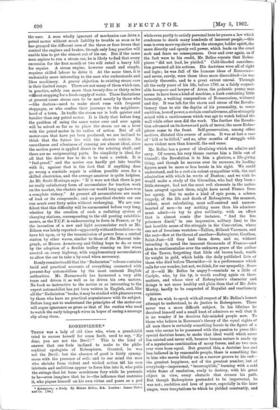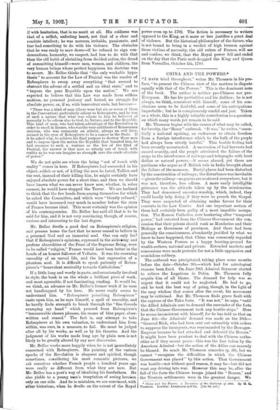ROBESPIERRE.*
THERE was a lady of old time who, when a grandchild tried to excuse herself for some fault, used to say, "My dear, you are not the Devil !" This is the kind of answer that one feels inclined to make to the philo- sophical apologists of Robespierre. Granted, he was not the Devil : but the absence of good is fairly synony- mous with the presence of evil : and to our mind the man who shrinks from violent and wicked action till his own inteiests and ambitions appear to force him into it, who pulls the strings that let loose murderous fury while he pretends to be—even imagines that he is—the influence that restrains it, who piques himself on his own virtue and poses as a god • Robespierre: a Study. By Hilaire Ballot, BA. London : James Nisbet
u nd Co. [168.]
while even partly to satisfy personal hate he passes a law which condemns to death many hundreds of innocent people,—this man is even more repulsive than the stronger, bolder spirit, the more directly and openly evil power, which leads on the cruel mob and fears no consequences. Over and over again, as if the fact were to his credit, Mr. Belloc repeats that Robes- pierre "did not lead, he yielded." Cold-blooded considera- tion governed all his actions. His doctrines were all of right and logic ; he was full of the humane ideas of Rousseau— and never, surely, were those ideas more discredited—he was entirely theoretic, and to a great extent unreal Through all the early years of his life, before 1789, as a fairly respect- able bourgeois and lawyer of Arras, the pedantic young man seems to have been a kind of machine, a husk containing little humanity, a walking compendium of Rousseauism, withered and dry. It was left for the storm and stress of the Revolu- tionary time to stir the depths of his personality, to rouse ambition, love of power, a certain combativeness, all so strangely mixed with a cautiousness which was apt to watch behind the wall while other men did the work. The further the Revolu- tion advanced on its downward path of terror, the more Robes- pierre came to the front. Self-preservation, among other motives, dictated this course of action. It was at last a ease of "kill or be killed," and so, after months of struggle with more violent men than himself, the end came.
Mr. Belloc has a power of idealising which we admire and envy. Of course, his very theme carries him a little out of himself ; the Revolution is to him a glorious, a life-giving thing, and though he mourns over its excesses, its leading figures must be more or less heroic in his sight. We could understand, and to a certain extent sympathise with, the real admiration with which he wrote of Danton; and we wish he would make a study of the Girondins, who had they been a little stronger, had not the most evil elements in the nation been arrayed against them, might have saved France from her agony. But to make a kind of epic poem, a solemn tragedy, of the life and death of Robespierre, the meanest, coldest, most calculating, most self-centred and narrow- hearted of men—to say nothing more than his admirers must admit—to try to give sublimity, with an effect that is almost comic (for instance, " And the five prisoners dined," in one impressive, solitary line) to the last horrible scene of the struggle in the Convention, where one set of ferocious wretches—Tallien, Billa.ud-Varennes, and the rest—flew at the throat of another—Robespierre, Couthon, Saint-Just—till they had them down, and so, without intending it, saved the innocent thousands of France—and then to sentimentalise over the unknown grave of the author of the Terror, forgetting that little old brown book, worth its weight in gold, which holds the daily published lists of those who died before Thermidor—it is a performance which calls for our wonder, but not, we think, for our sympathy. Some of it—will Mr. Belloc be angry P—reminds us a little of Carlyle, who, by the by, is worth reading again on these matters, and whose view of Robespierre's character and doings is not more healthy and plain than that of Mr. John Morley, hardly to be suspected of Royalist and reactionary opinions.
But we wish to speak with all respect of Mr. Belloc's honest attempt to understand, to do justice to Robespierre. There never was a more difficult subject. In his lifetime he deceived himself and a small knot of admirers so well that it is no wonder if he deceives fair-minded people now. To those who believe in Rousseau's theory of the equal rights of all men there is certainly something heroic in the figure of a man who seems to be possessed with the passion to press this special doctrine home, to make that ideal world which never has existed and never will, because human nature is made up of a mysterious combination of many forces, and no two men. ever were born equal. But granted this, a doctrine less and less believed in by reasonable people, there is something fine in him who moves blindly on in a narrow groove to his end— the greatest happiness, not of the greatest number, but of everybody—impersonal, "incorruptible," burning with a cold white flame of resolution, ready to destroy, with his great object in view, every obstacle that crosses his path. But though Robespierre pretended to be impersonal, he was not ; ambition and love of power, especially in the later stages, were temptations to which he yielded constantly, and
if with hesitation, that is no merit at all. His coldness was that of a selfish, unfeeling heart, not that of a clear and resolute intellect; he was nervous, irritable, passionate, and fear had something to do with his violence. The obstacles that he was ready to mow down—if he refused to sign con- demnations, humanity, we suspect, had less to do with that than the old habit of shrinking from decided action, the dread of committing himself—were men, women, and children, the very human beings whose perfect happiness his doctrine was to secure. Mr. Belloc thinks that "the only workable hypo- thesis" to account for the Law of Prairial was the resolve of Robespierre to sweep away everything "that seemed to obstruct the advent of a settled and an ideal state," and to ‘` impose the pure Republic upon the nation." We are expected to believe that this Law was made from selfless
motives, no personal jealousy and hatred, no struggle for absolute power, or, if so, with benevolent ends, but because— "There was a kind of man (there were but six or seven of them in the Convention) particularly odious to Robespierre, and he was of such a nature that what was odious to him he believed of necessity to be odious also to God, to Nature, and to the Republic. This kind of man, who had taken advantage of the Revolution in order to excel in licence, who was the very antithesis of Rousseau= stoicism, who was commonly an atheist, always an evil liver, seemed in the eyes of Robespierre to be a cancer in the State. If it be asked why, to achieve his final purpose to destroy these men and to impose upon the nation the Republic that haunted him, he had recourse to such a venture as the law of the 22nd of Prairial, the answer is that men so utterly out of touch with reality as he was can imagine no strength save the crude absolute of power."
We do not quite see where the being "out of touch with reality" comes in here. If Robespierre had succeeded in his object, selfish or not, of killing the men he hated, Tallien and the rest, instead of their killing him, be might certainly have
enjoyed absolute power for a short time, and then we should have known what we can never know now, whether, in sober earnest, he would have stopped the Terror. We are inclined to think that the few heads from among themselves for which he asked the Committee, and which were "bluntly refused," would have increased very much in number before the state of France became ideal. This most certainly was the opinion of his contemporaries. Mr. Belloc has said all that is to be said for him, and it is not very convincing, though, of course, curious and interesting to the last degree.
Mr. Belloc dwells a good deal on Robespierre's religion, and presses home the fact that he never ceased to believe in a personal God and an immortal soul. One can only feel that if Robespierre's opinions, expressed in the sickening and profane absurdities of the Feast of the Supreme Being, were to be called "religion," France would have been better in the hands of an honest follower of Vollaire. It was the crowning unreality of an unreal life, and the last expression of a phantom soul. It is difficult to speak patiently of Robes- pierre's "benevolent neutrality towards Catholicism."
If a little long and wordy in parts, and occasionally involved in style, the book is on the whole a brilliant piece of work, and most agreeable, if not fascinating, reading. It would be, we think, an advance on Mr. Belloc's former work if he were not handicapped by his hero. He never really seems to understand him. "Robespierre preaching Robespierre" casts upon him, as he says himself, a spell of unreality, and he hardly finds strength to break through the "fine threads cramping my hand" which proceed from Robespierre's "innumerable chosen phrases, his reams of blue paper, close- written and erased." The fact is, any attempt to take Robespierre at his own valuation, to understand him from within, was sure, in a measure, to fail. He must be judged after all by his works, as well as by his theories. And the judginent of his works made long ago by plain men is not likely to be greatly altered by any new discoveries.
Mr. Belloc works more happily when he is not ijnmediately concerned with Robespierre. His painting of the various epochs of the Revolution is eloquent and spirited, though sometimes, considering his most romantic pictures, we ask ourselves whether French people a hundred years ago were really so different from what they are now. But Mr. Belloc has a poet's way of idealising his forefathers. He also yields to a young man's temptation of seeing heroism only on one side. And he is mistaken, we are convinced, with other historians, when he dwells on the extent of the Royal power even up to 1792. The fiction is .necessary to writers opposed to the King, as it more or less justifies a great deal of violence. But the historical philosopher of the future, who is not bound to bring in a verdict of high treason against those victims of necessity, the old rulers of France, will see and confess, we think, that the Royal power fell and ended on the day that the Paris mob dragged the King and Queen from Versailles, October 5th, 1789.











































 Previous page
Previous page